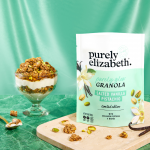From Bees To A Business Model: Inside Mellody’s Plan To Build A Plant-Based Honey Market

Mellody, the plant-based honey brand launched by Silicon Valley-based MeliBio, is readying to substantially scale up its business through a new retail distribution partnership with KeHE which is set to bring its products to between 500 to 1,000 U.S. stores by the end of the year, starting with Town & Country Markets in the Pacific Northwest region.
But the retail-facing brand, which launched in March 2023, is just a small portion of MeliBio’s current business model. The company is steadily increasing its foodservice distribution and B2B ingredient supply partnerships in the U.S. as well as private label agreements abroad in order to scale while validating the concept.
“An omni-channel strategy is something that people don’t sign up for lightly because it can draw questions around the focus, team and the resource allocations [which] are really fair,” said co-founder and CEO Darko Mandich. “When we were analyzing our situation, we realized that the most difficult thing that this company achieved was making honey without bees. The question around different channels [comes] at the very end of the line.”
In other words, channel strategy decisions at this stage are simply a matter of what size package the product ends up in, a process that has allowed Mellody, which self-manufactures its alternative honey products at its California facility, plenty of latitude to test, learn and iterate.
The decision to go omnichannel right out of the gate was also made in collaboration with its investors, Mandich noted; parent company MeliBio has raised a total of $9.4 million across multiple rounds from partners including the Collaborative Fund, Astanor Ventures and Big Idea Ventures.
The company is also in the process of raising another round and believes it has a path to profitability over the next two to two-and-a-half years. Currently, B2B ingredient partnerships account for half of the business, Mandich said, while foodservice amounts to a little more than a third of sales and retail captures the remaining 20%.

The Path To Scale For A Novel Food Tech Product
MeliBio, which turned four years old this week, now sells two products under its Mellody brand in the U.S. – a Golden Clover (Original) Honey and a new Spicy Habanero variety. The Golden Clover product also has a substantial private label presence in Europe including via Aldi stores in Austria and Switzerland as well as through Narayan Foods’ Better Foodie brand.
As for future growth in international geographies, Mandich indicated that MeliBio is “doubling down” on building Mellody in the U.S. That is largely due to labeling requirements in Europe where the products were designated as a “vegan alternative to honey made with the fructose and glucose.”
“We had to work with a regulatory framework [in the EU] on honey that is way more defined and strict compared to the US. I was personally not happy with some of the labeling approaches there… [and] found that very limiting for us.”
Mandich claims that the first jar of honey MeliBio ever produced cost $300,000, but the scale it has achieved over the past two years has allowed the company to bring that price tag in line with regular honey in the U.S. and Europe. Mellody’s Golden Clover SKU retails for $12 per 12 oz. bottle.
In addition to its pricing strategy, the company’s communication plans have also evolved as the product has entered new channels, Mandich said.
“We can [now] actually start by talking about the taste, about the application, about the reality that our first customer was and still is Eleven Madison Park, a three Michelin star restaurant,” he said.
The plant-based fine dining restaurant also sells a 12.7 oz. version of the product under its consumer-facing Eleven Madison Home brand. That placement validated the product – now used in menu items at about 30 independent restaurants across the country, Mandich said – and established a foundation for higher-volume, broader-reaching restaurant expansions like with Next Level Burger, Mellody’s largest foodservice partner to date.
The vegan fast-casual chain, which also now operates Veggie Grill locations, has added a Truffle Honey Chik’n Burger, to its combined 20 locations across the U.S. featuring Mellody plant-based honey and DaRosario organic truffles.

Making Honey Without The Honey Bees
Mellody honey is made with over 30 plant varieties, which are processed into input ingredients that are then combined via a proprietary process. Unlike bee-derived honey which utilizes only plant nectar, MeliBio is able to process the entire plant, including the roots. According to Mandich, the resulting product is nearly identical to regular honey on a molecular level and acts as a one-to-one replacement for the real thing.
Mandich, a former honey industry executive, saw firsthand how the commercial production of honey was wiping out biodiversity and killing native bee species. Mellody exists to “give bees fully a break,” and to “update the honey industry,” he explained.
“Our whole thesis is that honey is such a great product but the way it’s made comes with a lot of challenges for the environment, supply chain [and] the price volatility sides. We don’t want people to give up honey, we want people to give up the honey that’s being made in a way that is not the best for the planet and for the consumers.”
With its current process, Mellody has the ability to produce 10,000 lbs of honey per day; the forthcoming version of its technology uses precision fermentation and will open the door to producing more products than just the honey itself, Mandich said.
Headquartered in the tech-climate of Silicon Valley, Mandich noted Mellody’s unique advantages to scaling while many other “future of food,” tech-focused companies are still working out a viable path from science to commercialization.
“I think this crisis that’s happening to startups, it’s very hard, we can feel it [and] a lot of really good companies are not succeeding, but it’s also an opportunity to get back to fundamentals and build foundations,” Mandich emphasized. “That will help certain companies be successful, by using the essential fundamentals of business success: revenue and margin and therefore profit.”

















